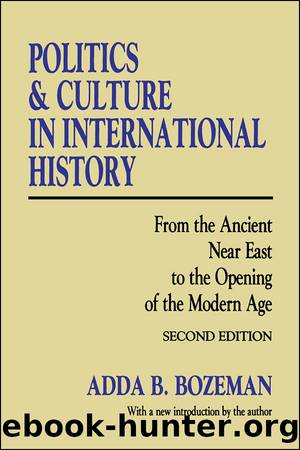Politics and Culture in International History by Adda B. Bozeman

Author:Adda B. Bozeman [Bozeman, Adda B.]
Language: eng
Format: epub
ISBN: 9781351498517
Barnesnoble:
Publisher: Taylor & Francis
Published: 2017-07-12T00:00:00+00:00
D. The Political Effect of the Crusades upon the Christian Community
The crusades had momentous and multifarious consequences for the course of international relations. They established contacts and exchanges between hitherto rather isolated civilizations that were to make it possible, in the course of the ensuing centuries, to formulate the concept of a world community. Within the Christian culture realm itself, on the other hand, the crusades had the immediate effect of accentuating the lines of cultural, religious, and political division that separated the Eastern from the Western commonwealth and prevented the different Western factions from coalescing into one international empire.
All of the labors of the Byzantine emperors and Roman popes to stay the religious schism that had divided Christendom since 1054 had been fruitless, and all of the policies to rejoin the two parts of ancient Rome into a unified political empire had failed, whether shaped by Greek caesars hoping to regain mastery of the West, or by Roman popes and emperors eager to extend their power over the East.114 The short-lived Latin Empire, which was called into being after Byzantium had been âconfiscatedâ and partitioned by the Western Christians in 1204, was an object lesson in that it disclosed that the Greek orthodox faith and Byzantine culture forms were too deeply rooted to permit of latinization either by propaganda or by force and perfidy. Henceforth, no theological or legal pretence could hide the fact that the two Christian empires were alien powers, each faced with its own problems of international organization and foreign policy-making. Nothing emphasized this difference quite as strongly as their respective attitudes toward Islam in general and the crusades in particular.
Centuries of coexistence in the Near Eastern region had fostered certain cultural affinities between Byzantium and the Arab world which cushioned the impact of their religious rivalries and military clashes and made for many areas of mutual understanding and respect.115 By contrast, the Frankish friends appeared upon the local scene as a culturally alien and inferior people, and this impression was deepened, naturally, when they began to loot and plunder the newly entered land. In the eyes of the Greeks, most of the Western crusaders were barbarians, and since they encroached rather freely on the Byzantine territory and possessions, actual enemies of a sort.
Much of the Eastern Empireâs early power and glamor had already waned when the crusading epoch opened: social upheavals, internal treachery, governmental ineptitude, and royal excesses had combined to demoralize and impoverish the Byzantine society. And two centuries later, in the middle of the fourteenth century, a general pessimism was to seize the population when the Black Death swept over the Empire from the east and decimated its inhabitants. The lingering state of crisis and anxiety, meanwhile, was being aggravated by the relentless pressure of the Turks, who knew how to take advantage of Byzantiumâs troubles. In the eleventh century they inflicted a heavy military defeat on the Byzantine army, detaching the Empireâs easternmost provinces.116 Byzantiumâs foreign policy-makers, consequently, were interested primarily in
Download
This site does not store any files on its server. We only index and link to content provided by other sites. Please contact the content providers to delete copyright contents if any and email us, we'll remove relevant links or contents immediately.
Phoenicians among Others: Why Migrants Mattered in the Ancient Mediterranean by Denise Demetriou(608)
american english file 1 student book 3rd edition by Unknown(607)
Verus Israel: Study of the Relations Between Christians and Jews in the Roman Empire, AD 135-425 by Marcel Simon(591)
Caesar Rules: The Emperor in the Changing Roman World (c. 50 BC â AD 565) by Olivier Hekster(578)
Basic japanese A grammar and workbook by Unknown(573)
Europe, Strategy and Armed Forces by Sven Biscop Jo Coelmont(520)
Give Me Liberty, Seventh Edition by Foner Eric & DuVal Kathleen & McGirr Lisa(497)
Banned in the U.S.A. : A Reference Guide to Book Censorship in Schools and Public Libraries by Herbert N. Foerstel(492)
The Roman World 44 BC-AD 180 by Martin Goodman(478)
Reading Colonial Japan by Mason Michele;Lee Helen;(469)
DS001-THE MAN OF BRONZE by J.R.A(462)
Introducing Christian Ethics by Samuel Wells and Ben Quash with Rebekah Eklund(456)
Imperial Rome AD 193 - 284 by Ando Clifford(454)
The Oxford History of World War II by Richard Overy(454)
The Dangerous Life and Ideas of Diogenes the Cynic by Jean-Manuel Roubineau(451)
Catiline by Henrik Ibsen--Delphi Classics (Illustrated) by Henrik Ibsen(427)
Language Hacking Mandarin by Benny Lewis & Dr. Licheng Gu(410)
Literary Mathematics by Michael Gavin;(407)
Brand by Henrik Ibsen--Delphi Classics (Illustrated) by Henrik Ibsen(390)
